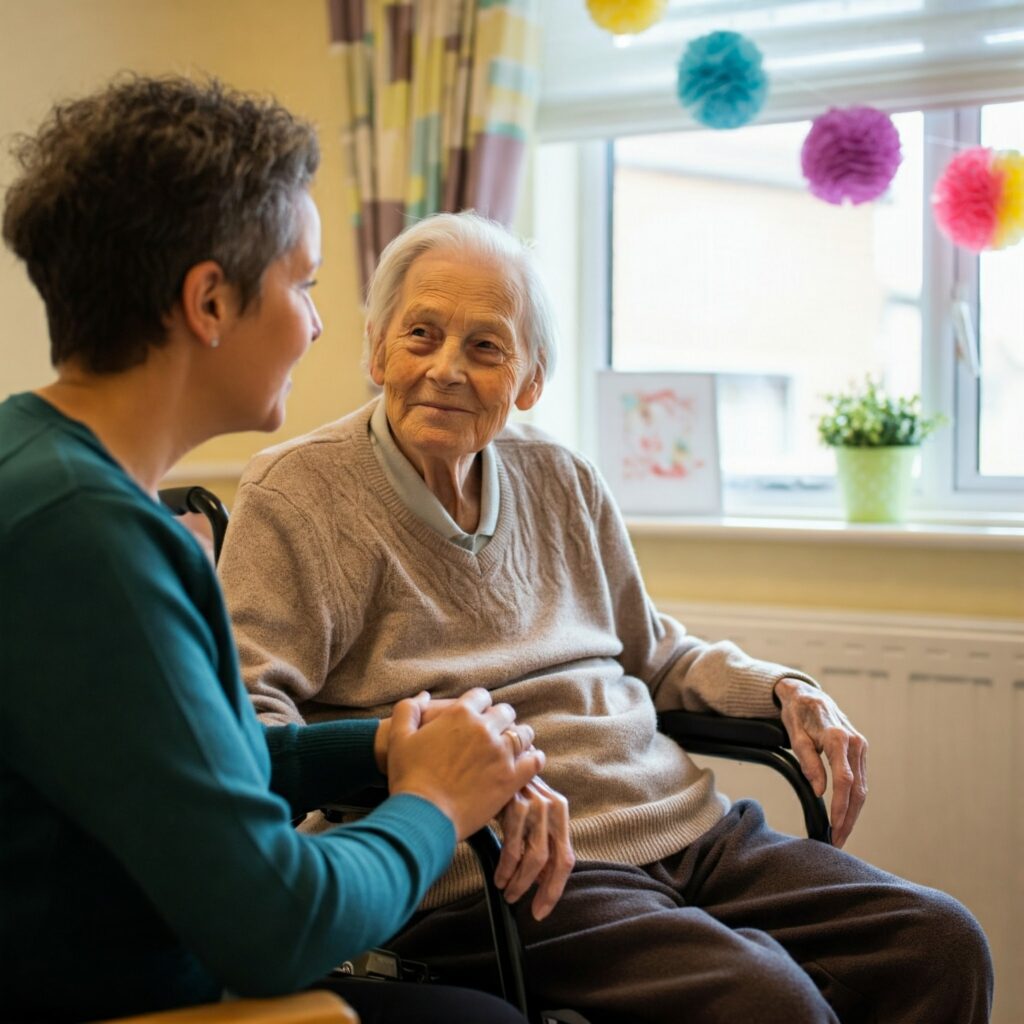Caring for someone with dementia can be both a rewarding and emotional journey that requires immense compassion, patience, and understanding. As dementia progresses, it brings challenges that can be overwhelming for both the individual affected and their loved ones. In this blog, we will explore practical strategies for providing the best possible care, helping you navigate the complexities of day-to-day life while ensuring the dignity and comfort of your loved one.
We will also discuss the difficult decision of when it may be time to consider a care home, offering guidance to help you make this choice with confidence and compassion. Caregivers play a critical role in the well-being of someone with dementia, so we’re here to support you.
Table of Contents
How do you care for someone with dementia?
Emotional and Psychological Impact
The emotional and psychological impact of dementia can be intense for both the individual diagnosed and their caregivers in significant ways. For the person with dementia, the gradual loss of memory, cognitive abilities, and independence can lead to feelings of frustration, fear, confusion, and sadness. As they become increasingly aware of their declining abilities, they may experience anxiety and depression, struggling to make sense of a world that seems increasingly unfamiliar. This emotional turmoil can manifest in various ways, including mood swings, agitation, or withdrawal from social interactions, further complicating the caregiving process.
There are support groups available for family members and carers, plus plenty of advice for practical and physical aspects of caring for someone living with dementia too.
The Alzheimer’s Society provides a practical guide for caring for a person with dementia.
Dementia UK also offers specialist advice and support through their Admiral Nurse helpline.
Establishing a Routine
Establishing a routine is important when caring for someone with dementia as it can provide comfort and help with feelings of stress, isolation or lack of control.
Routine can reduce confusion and anxiety which allows those living with dementia to maintain their independence for longer. It’s important for a routine to include things that the person enjoys as well as day-to-day care and wellbeing tasks such as eating, drinking and bathing.
Visual cues about what types of food and drink are available and the person likes can help reduce some of the stress around mealtimes. With these mealtimes being at the same or similar times each day to provide a basic structure.
Another key thing to include either within the daily or weekly routine is time that promotes staying active. It can have powerful benefits physically and mentally for the wellbeing of the person living with dementia. Whether that’s as simple as a walk each morning, meeting up within a community for low impact activities or social activities, these can always be great markers within a routine.
A great tip to apply when creating a routine is to break down tasks into smaller steps and give the person plenty of time to meet each one without adding pressure or stress to the situation. It’s best to keep up with a routine for as long as possible, making adaptations where necessary to continue with activities and the same routine even as physical or mental deteriorates.
Communication Tips
Be sure to speak clearly and use simple sentences when talking to people living with dementia and remember to be patient.
A key way you can improve communication is to ask how the person would like to be helped rather than assuming, this will also help with them maintaining some or most of their independence by giving them the choice. Simple tips such as creating signs with pictures and words are also a great way to create communication cues that take the pressure off of those with dementia.
The NHS have plenty of advice on how to look after someone with dementia and tips on ways to make communicating easier.
Managing Behavioral Changes
Caring for someone with dementia often involves managing challenging behaviors like aggression, wandering, and sundowning (when confusion or agitation worsens in the evening). To cope, it’s essential to remain calm and avoid taking these behaviors personally, as they are often expressions of frustration or confusion rather than intentional actions. Creating a soothing environment, maintaining a routine, and using calming techniques such as gentle touch or music can help de-escalate difficult moments. Additionally, identifying triggers for behaviors like hunger, discomfort, or overstimulation, can prevent escalation. Patience and empathy are key to helping your loved one feel secure and understood during these challenging episodes.
Promoting Independence
Promoting independence in individuals with dementia is a crucial aspect of care that not only helps preserve their sense of dignity but also enhances their overall quality of life. Encouraging the person to do as much as possible on their own, even as their cognitive abilities decline, fosters a sense of accomplishment and self-worth. It can be deeply empowering for someone with dementia to maintain control over certain aspects of their daily life, whether it’s dressing themselves, preparing a simple meal, or engaging in hobbies they enjoy. The goal is to strike a delicate balance between providing support and allowing the individual to retain as much independence as possible, which can vary from day to day depending on their abilities and mood.
Adapting tasks and the environment to the person’s abilities is key to promoting this independence. This may involve simplifying tasks into smaller, more manageable steps, which can make activities feel less daunting and more achievable. For example, instead of asking someone to dress entirely on their own, you might break it down into stages—laying out clothes in the order they should be put on, or choosing clothing that is easy to slip into, such as items with elastic waistbands or Velcro fastenings. This not only reduces frustration but also increases the likelihood of success, which can boost the person’s confidence.
You could also provide visual cues, label drawers, or place frequently used items within easy reach to help a person navigate their environment and their day-to-day tasks more easily.

Safety Considerations
When caring for someone with dementia, ensuring their safety is of the utmost importance, as the cognitive and physical challenges associated with the condition can increase the risk of accidents and injuries. Making the home dementia-friendly is a crucial step in creating a secure environment. You should consider risks such as:
- Slippery surfaces
- Walking surfaces that aren’t flat
- Remove trip hazards or cluttered spaces
- Install locks if necessary
- Secure outdoor space e.g. fence or gates to prevent someone from wandering off
- Improving lighting around the house
Day-to-day considerations to improve the home environment might include devices with large buttons or signage/clocks etc with large displays that are easy to read.
It’s important to monitor for signs that the person may need additional safety measures putting in place or whether you need to take the next steps to decide whether it is time to seek support from a home that provides dementia care.
When should someone with dementia go into a care home?
Signs That More Support Is Needed
Recognising the signs that more support is needed for someone with dementia is a critical aspect of caregiving. As the disease progresses, there often comes a point where the level of care required surpasses what can reasonably be provided at home, even by the most dedicated and capable caregivers. Understanding these indicators can help families make informed decisions about the next steps in care, ensuring the safety and well-being of their loved one.
Key signs that additional support or someone should move into a care home might include:
- The presence of physical aggression or severe behavioural changes that are difficult to manage at home
- Inability to perform daily tasks or maintain independence e.g. eating, dressing, bathing, or going to the toilet may become increasingly challenging
- If the dementia is impacting someone enough that they can no longer recognise dangers in their environment, then there could be a serious safety concern.
It is important to continuously assess the care needs of someone with dementia to understand the signs that more support is needed.
Assessing the Caregiver’s Capacity
Caregiving, especially for someone with dementia, can be physically and emotionally demanding, often pushing the caregiver to their limits. Recognising when these demands exceed what can be reasonably managed at home is essential to ensuring the well-being of the caregiver and the person with dementia.
It’s important for caregivers to be honest with themselves about their own physical and emotional limits. Fatigue, stress, and burnout are common in caregiving, and when these begin to take a toll, it can compromise the quality of care provided.
Maintaining your own physical and mental health is essential to sustaining your ability to provide care. Self-care strategies are vital, including practical tips such as taking regular breaks, engaging in activities or hobbies that bring joy, and ensuring that you have moments of rest and respite.
5 Signs it’s Time for Respite Care
By acknowledging your limits and actively seeking support, whether through a support group or by talking to family and friends, you can ensure that both you and your loved one receive the care and attention needed to navigate the challenges of dementia with compassion and resilience.
Choosing the Right Time
Choosing the right time to move a loved one with dementia into a care home is a complex and emotional decision that requires careful consideration of several factors. One of the primary factors to consider is the current and anticipated level of care that the person with dementia needs. As the disease progresses, their care needs may exceed what can be provided at home, even with the best intentions and efforts. Residential care homes have many benefits including specialist care providers and community.
Involving the person with dementia in the decision, if possible, is also important. While their ability to participate in the decision-making process will depend on the stage of their dementia, it’s crucial to respect their feelings and preferences. Having open and compassionate conversations with them about their needs and concerns can help ease the transition and ensure that their wishes are considered.
Involving the entire family in this decision is equally important. Family members can offer support, share the caregiving responsibilities, and help evaluate the best options for care. By discussing the situation openly and honestly, families can come to a consensus that prioritises the well-being of their loved one with dementia, making the transition to a care home smoother and less stressful for everyone involved.
Finding the Right Care Home
Finding the right care home for a loved one with dementia is a critical decision that requires careful research and consideration to ensure they receive the best possible care in a supportive and compassionate environment.
Starting this search sooner, rather than later is also important so you are prepared when your loved one reaches the stage where further support like a residential home is required. Having this discussion early on also allows you to talk to your loved one about their wishes for a care home, allowing them to have some autonomy over the situation.
Some things to consider when looking for the right care home might include:
- Considering the long-term needs of your loved one to avoid the need to move care homes
- Somewhere accessible for the family to visit
- Reviews from families of residents, as well as official documents such as the Care Quality Commission report for the home
- Visit the facilities – Are the staff friendly? Does it offer good activities? Is there a sense of community? Are the facilities high quality? Can the home meet the medical, physical, and emotional requirements of your loved one?
Find a comprehensive guide for choosing the right Dementia care home for your loved one written by our experts here.

Next Steps
No matter which stage of care you, your loved one and your family are experiencing, it’s important to know that you are not going through this alone and seeking help when needed is key.
Splendid Healthcare is a leading UK provider of dementia care on the South Coast. Our compassionate and highly trained team of caregivers and healthcare professionals are committed to upholding the highest standards of care, ensuring that each individual receives personalised support tailored to their unique needs and circumstances.
Our professionals are on hand to discuss your loved one’s dementia care and the supportive, caring environment that our homes can offer.
Find a Home:




